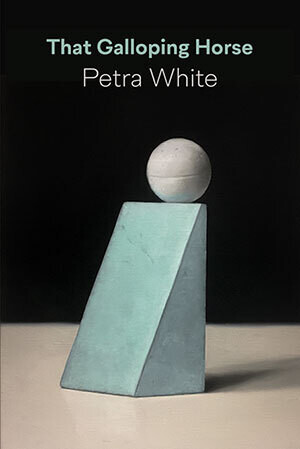 Reviewed by Beatriz Copello
Reviewed by Beatriz Copello
The Galloping Horse
by Petra White
Shearman Books
ISBN: 9781848619142, January 2024, Paperbackm 76 pages
The Galloping Horse is the sixth book written by Petra White, an Australian author who has lived in various Australian and European cities. Currently she lives in Belfast. The poems in The Galloping Horse are distinctively unique and magnificently well-written in free verse that leaves the reader thinking. White raises both overt and covert questions and proposes explanations to issues such as the nature of beauty and sorrow.
White delves into the reality of relationships, the quarrels, the monotony, the attempts to regulate love as well as the pain and pleasures of parenthood. Some of the poems take the reader to cold winter days in deserted cities with stories of travel and exile. Some of the poems blend abstract with concrete, taking the reader to different settings such as “Journal in August Berlin 2021″
Our love of beauty is love of ourselves —
blazes of unforgetting light.
How soiled the self, that seeks its own innocence
in branches, clear water, the glittering sky.
I stood in front of the Rothko, in London,
where my ghost self still lives,
alone in the small room, what have I done,
with my little self, boundaryless,
breathing dark red and black.
The Galloping Horse encourages an exploration of complex emotions and experiences, offering a way to process the more challenging aspects of life with a deep authenticity combined with skilful use of language and the ability to resonate with the reader on a deep level especially with melancholic subject matter.
Many of the poems convey life’s relentless pace and the intermingling of the mundane with moments of introspection or existential thought, for example, “Elegy (7)”, a poem that references the title and combines the everyday — emails, a cluttered room, a child’s toys — with images of classical heroism and the almost Sisyphean task of daily work and survival:
In the soft realm of home, where you move like a shoal of fish,
moonlit, eyes tilting to the night, emails keep flying straight in,
colleagues crowd like smoke
the room filled with human things, broken bookcase,
silver cat warming her haunches on the radiator,
daughter’s Lego pieces on the floor.
Who looks at these things but those who live here!
Work, that galloping horse we ride bareback,
clinging to its mane with reddening hands —
it settles on the dinner table,
almost apologetic, but grinning.
The duality presented in this poem and in others of similar style provoke a reflection on our own lives: the routine and the remarkable, the immediate and the eternal. There is beauty in the way the poems capture the human experience and invites the reader to find depth and meaning in their own seemingly ordinary moments.
Many of the poems reflect on the nature of joy and contentment, finding it not in the absence of suffering but within the strength and resilience that come through experience. They suggest that there is particular kind of happiness that comes from being loved by those who have known hardship and emerge with a quiet, sturdy strength —like a well-known spruce. The poems also celebrate the simple acts of living, singing, sighing, and the tactile feeling of being which contribute to the richness of life. The Galloping Horse is about finding happiness in authenticity and connection, both with others and the world around us.
Other different topics encountered in this captivating collection include such things as the war in Ukraine, the climate emergency, the atomic cloud of Maralinga, and many memories of places and people. If you like to read poetry that is both unique and lyrical, inspiring and thought-provoking, The Galloping Horse will certainly appeal.
About the reviewer: Dr Beatriz Copello is an award-winning poet, she writes poetry, fiction, reviews and plays. The author’s books are: Women Souls and Shadows, Meditations At the Edge of a Dream, Under the Gums Long Shade, Forbidden Steps Under the Wisteria, A Call to the Stars translated and published in China and Taiwan, Witches Women and Words, No Salami Fairy Bread, Rambles, Renacer en Azul and Lo Irrevocable del Halcon (In Spanish). Copello’s poetry has been published in literary journals such as Southerly and Australian Women’s Book Review and in many feminist publications. The author has participated in international conferences, has taught Creative Writing at W.S.U. and other scholarly institutions, she has read her poetry at Writers Festivals and other poetry events in Australia and overseas. Copello is mentioned amongst the forty “most notable people” graduated from the University of Technology.